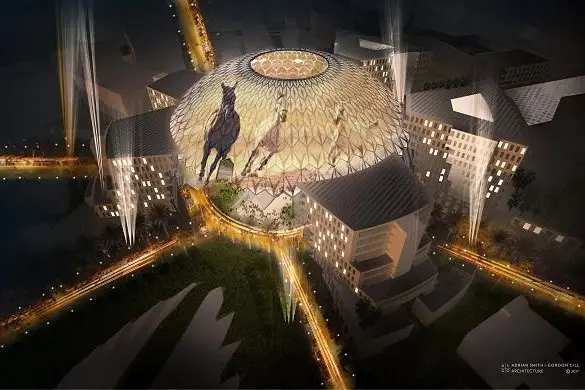PHOTO
Speaking at the firm's 2018 predictions event in Dubai on Tuesday morning, JLL MENA's national director for project and development services, Alan Baker, said: “The total value of construction directly related to Expo 2020 is reported to be around $6.1 billion, which is made up of $3.8 billion of building construction and $2.3 billion of transport and infrastructure projects.
"Just over 50 percent has been awarded to date, but the (percentage) value of infrastructure to be awarded is now in single figures," Baker added. "I think you can see that when you drive around Dubai and you see the amount of infrastructure work that is ongoing at the moment."
In contrast, most of the building construction work has yet to be awarded, Baker said, adding that two-thirds of this, with a value of $2.5 billion, is due to be brought forward this year.
He pointed out that although some major building packages have already been awarded, such as the thematic districts, Al Wasl Plaza and the UAE Pavilion at the 4.38km Expo site, there is still plenty of other work up for grabs.
"Many of the significant building contracts are already in procurement, but there are still a number of remaining opportunities for new entrants, for various Expo pavilions, including the self-built Expo pavilions for various countries and event support superstructures, as well as some of the later phases of the residential work which is related to the Expo site."
In late November last year, the event's organising committee said that it had awarded 10.8 billion UAE dirhams ($2.94 billion) worth of construction contracts during 2017. Last month, two more contracts for a major access road and for two site hotels were awarded to British contractor Laing O'Rourke valued at a combined 670 million dirhams.
Contract packages for the self-built pavilions would be awarded by each individual country.
It is understood that the bulk of the work due to be commissioned directly by the Expo organising committee has already been procured, but contracts for the site’s parks, public realm and landscaping are not yet awarded.
Moreover, some main contractors have yet to award packages for mechanical, electrical and plumbing (MEP) and fit-out work.
Alongside the contracts directly related to Expo, Baker said that "there are a number of associated private sector developments" that need to be completed in time for the event.
However, he added that some of these schemes may not be as grand as originally envisaged.
"What we have seen is, over recent years, there has been a scaling down of some projects to perhaps more realistic levels."
He said that developers had been "exercising some caution in relation to the potential market conditions in the area following the Expo event".
He also said that despite the volume of work due to be awarded in 2018, pricing is expected to remain competitive as fewer new projects are due to come on stream later in the year.
“We know that the construction industry is already nervous about the pace at which the pipeline of opportunities is coming to the market,” Baker said.
A GCC construction sector survey published on Sunday last week by law firm Pinsent Masons stated that sentiment among industry professionals had improved by 7 percent over the past two years, but was still fairly negative, with only 39 percent of respondents reporting optimism about the market.
The UAE was named as the country most expected to deliver opportunities by 38 percent of respondents – a 3 percent increase on two years ago.
In a press release announcing the results, Sachin Kerur, Middle East head of Pinsent Masons, said: “The UAE is set to see an increase in the number of projects during 2018 and we expect the country to remain in top position, particularly in the lead up to Expo 2020.”
(Reporting by Michael Fahy; Editing by Anoop Menon).
(michael.fahy@thomsonreuters.com)
Our Standards: The Thomson Reuters Trust Principles
Disclaimer: This article is provided for informational purposes only. The content does not provide tax, legal or investment advice or opinion regarding the suitability, value or profitability of any particular security, portfolio or investment strategy. Read our full disclaimer policy here. © ZAWYA 2018





















